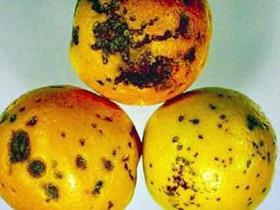
Despite the fact that the European Food Safety Authority (EFSA) will release its report on the risk that Citrus Black Spot (CBS) infected citrus products from South Africa may pose for European citrus producers this week, it unlikely that it would lead to any immediate decisions.
South African sources says the EFSA report may come up with anyone of three possible findings, but says it will take some time to digest the information and the report will probably not be discussed before the end of March.
The EFSA report may declare that there is no chance that fruit from South Africa will carry CBS to the orchards of European producers, or it may declare that there is a real and quantifiable risk. The South Africans believe the finding will, however, be somewhere in the middle. It is more likely that the EFSA will state that although the chance of CBS travelling to Europe on South African citrus is remote, there is still the slightest chance that it could happen.
How this will be interpreted is a matter to be seen and unlikely to be clarified before the EU’s Standing Committee on Plant Health’s meeting at the end of March. This will give lobby groups, and the South Africans, enough time to talk behind the scenes to see what solutions can be found.
In the meanwhile the South African Citrus Growers’ Association (CGA) has warned growers of what the term ‘devastating business consequences’ means if they fail to follow ‘all the requirements' in terms of CBS.
This show just how serious the South Africans are taking the matter and just how complex and difficult it will be this season for fruit to be exported to the European Union.
“If you have registered an orchard for the EU; and for any reason you have concerns regarding the CBS status of the orchard then WITHDRAW the orchard immediately. Failure to do so could mean an orchard “hit” and classification as a high risk PUC and exclusion from the EU market,” says the CGA in its warning to growers.
According to the advice, DAFF, South Africa’s Department of Agriculture, are busy with orchard registration verification inspections.
“DAFF is being very thorough in ensuring that appropriate treatment has been administered. Where a treatment has been deemed inappropriate the orchard is not registered. All orchards on the 2013 black and alert list needed to apply for reinstatement.”
The CGA also states that all orchards to be harvested for the EU must be inspected prior to harvesting. Growers must also demonstrate that fruit for the EU that is not under cooling within six days after packing is presented for an additional port inspection.
Fruit for the EU that is not shipped within 18 days after first inspection is presented for an additional port inspection. Any fruit destined for the EU, and not shipped within 28 days after first inspection will not be permitted to be exported to the EU.
Meanwhile, the South Africans have stepped up their communication with the various EU entities, something that was deemed to be lacking in the past. It is hoped that more direct communication with the EU authorities will bring about more understanding for all the efforts undertaken in South Africa to reduce any risk to acceptable proportions.



